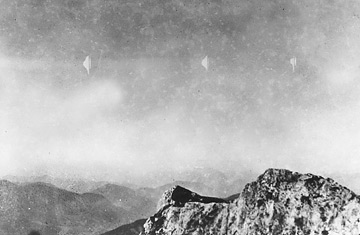
Could there be a rational explanation for unidentified flying objects?
X-Files fans take note: The truth may be out there, online, starting today. This week Britain's Ministry of Defence (MoD) begins releasing all its files about UFOs — in ministry parlance, "Unidentified Aerial Phenomenon" — on a government website, free for download.
The MoD posts brief notes of reported UFO sightings already. But these newly released files will go back further in time, to the 1970s, and will contain everything: not just brief summaries of what appeared when, the ministry says, but the full correspondence between witnesses and the government for every single sighting, and any notes about government follow-up.
"Most of the material is obviously misidentification of fairly ordinary objects: aircraft lights, meteorites, the planet Venus," says Nick Pope, a former MoD employee who, as head of the ministry's UFO program for three years in the early 1990s, is well acquainted with these early files. But the longer Pope spent studying the data, the more he came to believe that some UFO sightings really can't be explained by terrestrial activity — a conclusion that earned him a reputation as "Britain's Fox Mulder." "You've got to really drill down into it to get the good stuff, but the good stuff is there," he says.
Pope claims, for example, that amid the reams of letters from cranks and people fooled by commercial airplanes there are also a handful of sightings from police officers and military pilots, sometimes after unidentified aerial phenomena were tracked on radar making physically implausible movements. All those files should be available for public viewing too.
For its part, the MoD has said in a statement it does not consider questions about life on other planets; it tracks the sightings "solely to establish whether U.K. airspace may have been compromised by hostile or unauthorized military activity." So why release the files now? A spokeswoman says the ministry gets as many as 150 or 200 requests for the files each year, and under Britain's Freedom of Information Act is obliged to answer almost all of them. "We have other priorities," she says. "The most resourceful thing to do is just get [these files] into the public domain."
It's an immensely time-consuming process. Ministry staff are now going through each file to redact personal information like names and addresses in correspondence, and then scanning each page for online publishing. The whole procedure should take about three years, with files rolled out in batches, posted online on the U.K. National Archives website. Files are available for free download for the first month; afterward, users will have to pay.
It may help UFO enthusiasts answer some of their out-of-this-world questions. But Pope, for one, isn't hopeful. "I just think most people will get so tired of going through hundreds of pages from people out walking their dogs at night who see a white light in the sky," he says. And even if a reader should stumble across a sign of something that seems alien, the reams of paperwork aren't likely to explain it. "There is no smoking gun in these files," Pope says. "There's no spaceship in an airplane hangar." Still, he's not ready to dismiss the prospect that there's something deep in the data to suggest that there is indeed something out there.
